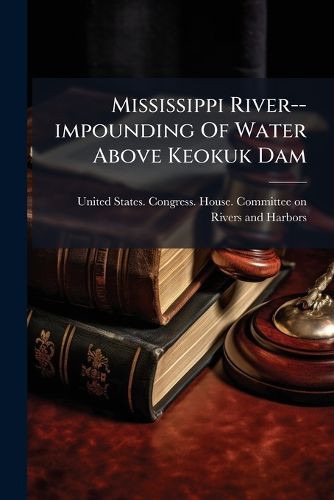Readings Newsletter
Become a Readings Member to make your shopping experience even easier.
Sign in or sign up for free!
You’re not far away from qualifying for FREE standard shipping within Australia
You’ve qualified for FREE standard shipping within Australia
The cart is loading…






This volume contains the hearings regarding House Resolution 468, directing an investigation into the alleged impounding of water above the dam in the Mississippi River at Keokuk. It delves into the effect of the dam on the surrounding environment and communities. The hearings, conducted by the United States Congress House Committee on Rivers and Harbors, offer insights into the engineering, legal, and environmental considerations surrounding large-scale river infrastructure projects.
Researchers and historians interested in the development of the Mississippi River, environmental law, and the impact of infrastructure on river systems will find this a valuable resource. The document provides a detailed snapshot of the concerns and debates surrounding river management in the early 20th century, making it relevant to contemporary discussions about sustainable development and environmental conservation.
This work has been selected by scholars as being culturally important, and is part of the knowledge base of civilization as we know it. This work was reproduced from the original artifact, and remains as true to the original work as possible. Therefore, you will see the original copyright references, library stamps (as most of these works have been housed in our most important libraries around the world), and other notations in the work.
This work is in the public domain in the United States of America, and possibly other nations. Within the United States, you may freely copy and distribute this work, as no entity (individual or corporate) has a copyright on the body of the work.
As a reproduction of a historical artifact, this work may contain missing or blurred pages, poor pictures, errant marks, etc. Scholars believe, and we concur, that this work is important enough to be preserved, reproduced, and made generally available to the public. We appreciate your support of the preservation process, and thank you for being an important part of keeping this knowledge alive and relevant.
$9.00 standard shipping within Australia
FREE standard shipping within Australia for orders over $100.00
Express & International shipping calculated at checkout
This volume contains the hearings regarding House Resolution 468, directing an investigation into the alleged impounding of water above the dam in the Mississippi River at Keokuk. It delves into the effect of the dam on the surrounding environment and communities. The hearings, conducted by the United States Congress House Committee on Rivers and Harbors, offer insights into the engineering, legal, and environmental considerations surrounding large-scale river infrastructure projects.
Researchers and historians interested in the development of the Mississippi River, environmental law, and the impact of infrastructure on river systems will find this a valuable resource. The document provides a detailed snapshot of the concerns and debates surrounding river management in the early 20th century, making it relevant to contemporary discussions about sustainable development and environmental conservation.
This work has been selected by scholars as being culturally important, and is part of the knowledge base of civilization as we know it. This work was reproduced from the original artifact, and remains as true to the original work as possible. Therefore, you will see the original copyright references, library stamps (as most of these works have been housed in our most important libraries around the world), and other notations in the work.
This work is in the public domain in the United States of America, and possibly other nations. Within the United States, you may freely copy and distribute this work, as no entity (individual or corporate) has a copyright on the body of the work.
As a reproduction of a historical artifact, this work may contain missing or blurred pages, poor pictures, errant marks, etc. Scholars believe, and we concur, that this work is important enough to be preserved, reproduced, and made generally available to the public. We appreciate your support of the preservation process, and thank you for being an important part of keeping this knowledge alive and relevant.